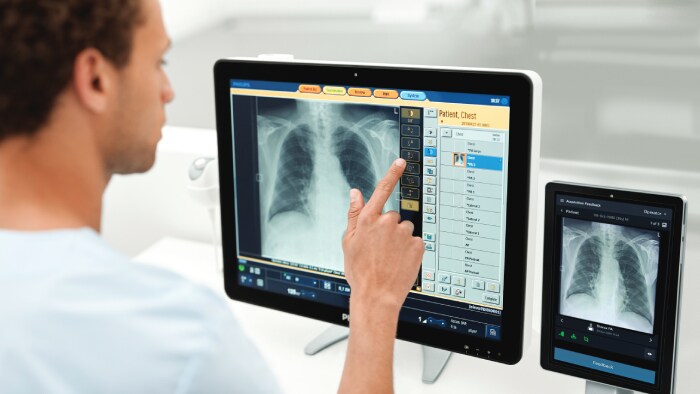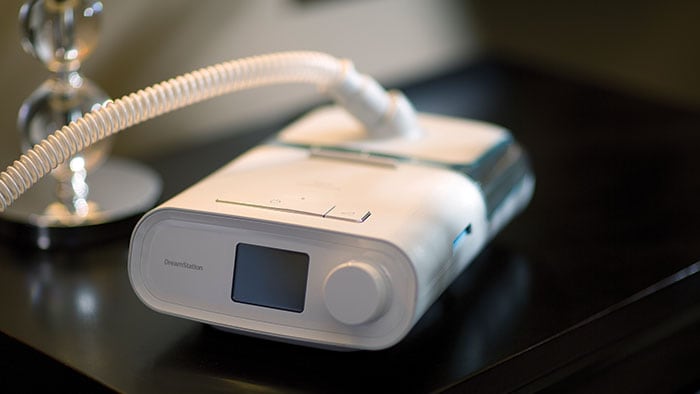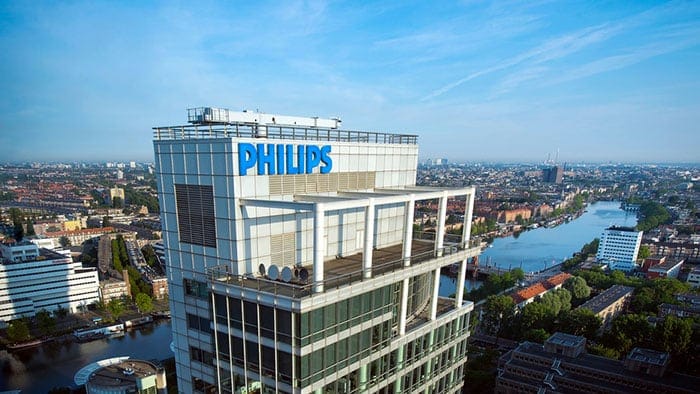mai 11, 2021
Philips debuts AI-powered Radiology Smart Assistant in Nordics to enhance radiography image acquisition
[Local Market – DACH/Benelux/Nordics] – Royal Philips (NYSE: PHG, AEX: PHIA), a global leader in health technology, today announced the launch of its AI-enabled [1] Radiology Smart Assistant [2] for posteroanterior (PA) chest X-rays in Nordics. By providing immediate feedback to radiographers about accurate patient positioning and generating a continuous log of captured image quality for quality control and audit purposes, Philips Radiology Smart Assistant improves the accuracy of image acquisition, builds radiographer skills, and reduces variability. The solution provides consulting radiologists with higher quality images, which can support decreasing additional costs, delays and X-ray exposure associated with retakes. Requiring no system integration, the solution can be easily inserted into the routine workflows of existing imaging facilities and new installations that use Philips equipment.
PA chest X-rays are one of the most common and routine X-ray exams [3]. In order to capture the best possible images, the accurate position of the patient in regard to beam collimation and object rotation, including optimal inhalation status, is important. High patient throughput and a lack of objective feedback keeps well trained and motivated technologists from performing at their best. By applying AI-based image quality assessment techniques to evaluate the images captured by individual radiographers, Philips Radiology Smart Assistant acts as a ‘virtual coach’ to help improve patient positioning skills, highlighting areas and techniques for immediate improvement via a panel PC touchscreen interface directly at the point of acquisition. The solution also generates a web-based dashboard which provides a continuous overview about the image quality level and allows for the identification of staff training needs.
Philips Radiology Smart Assistant helps us to improve examination accuracy for PA chest radiograms and thereby enhances qualified image reading,”
Prof. Dr. Axel Gossmann,
Chair of the Department of Radiology, Cologne Merheim Medical Center, Germany.
“This concept represents an exciting path forward and definitely has the potential to become a future standard in imaging workflows,” said Prof. Dr. Axel Gossmann, Chair of the Department of Radiology, Cologne Merheim Medical Center, Germany. For technologists, high patient volumes can cause increased pressure and stress, while reimbursement rates are rather low [4]. Philips Radiology Smart Assistant addresses these immediate concerns with the hardware-software smart engine at the heart of the system, providing a gateway to the introduction of other innovative AI solutions at the point of image acquisition.
Philips Radiology Smart Assistant enables radiographers to do their jobs faster and better, enhancing job satisfaction and motivation through increased confidence.”
Daan van Manen,
General Manager for Diagnostic X-ray at Philips.
“This first-of-its-kind addition to our diagnostic X-ray portfolio is a perfect example of how Philips’ AI-driven smart workflows are improving imaging productivity and clinical confidence, while increasing radiology department and imaging service provider efficiency. This is an important step in enabling the path toward precision diagnosis,” said Daan van Manen, General Manager for Diagnostic X-ray at Philips. Today’s announcement adds to Philips’ smart workflow solutions in precision diagnosis, which leverage the company’s and third-party AI solutions to deliver optimized and automated workflows that empower providers to focus on the patient rather than dealing with the technology. Recent examples include the incorporation of Lunit’s INSIGHT CXR chest detection suite into Philips’ diagnostic X-ray suite, and AI-enabled optical respiratory sensor (VitalEye), automated planning and scanning (SmartExam) and Magnetic Resonance for calculating attenuation (MRCAT) into its MR suite. For more information on Philips Radiology Smart Assistant, visit the Philips Symposium session on smart workflows, featuring Dr. Gossmann, and recently presented at the European Congress of Radiology virtual event.
[1] Philips embraces the following formal definition of AI (source: HLEG definition AI) https://www.philips.com/a-w/about/artificial-intelligence/philips-ai-principles [2] Philips Radiology Smart Assistant is not a CE-marked or FDA cleared device. This product is only available for sale in selected markets. [3] IMV Research, 2017 X-ray/DR/CR Market Outlook Report 20172 Kumar S et al., J Am Coll Radiol 2020. [4] Kumar S et al., J Am Coll Radiol 2020.
About Royal Philips
Royal Philips (NYSE: PHG, AEX: PHIA) is a leading health technology company focused on improving people's health and well-being, and enabling better outcomes across the health continuum – from healthy living and prevention, to diagnosis, treatment and home care. Philips leverages advanced technology and deep clinical and consumer insights to deliver integrated solutions. Headquartered in the Netherlands, the company is a leader in diagnostic imaging, image-guided therapy, patient monitoring and health informatics, as well as in consumer health and home care. Philips generated 2020 sales of EUR 17.3 billion and employs approximately 77,000 employees with sales and services in more than 100 countries. News about Philips can be found at www.philips.com/newscenter.










